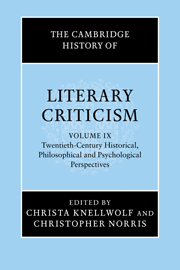Book contents
- Frontmatter
- Introduction
- HISTORY
- MARXISM AND POST-MARXISM
- 6 Marxism and literary criticism
- 7 Marxism and poststructuralism
- 8 Adorno and the early Frankfurt School
- 9 The ‘German–French’ debate: critical theory, hermeneutics and deconstruction
- 10 Post-war Italian intellectual culture: from Marxism to cultural studies
- FROM CULTURAL POETICS TO CULTURAL STUDIES
- PSYCHOANALYTIC APPROACHES
- GENDER AND SEXUALITY
- COLONIALISM, POST-COLONIALITY, NATION AND RACE
- MODERNITY AND POSTMODERNISM
- PHILOSOPHY, AESTHETICS AND LITERARY CRITICISM
- INTERDISCIPLINARY APPROACHES
- Bibliography
- Index
- References
7 - Marxism and poststructuralism
from MARXISM AND POST-MARXISM
Published online by Cambridge University Press: 28 March 2008
- Frontmatter
- Introduction
- HISTORY
- MARXISM AND POST-MARXISM
- 6 Marxism and literary criticism
- 7 Marxism and poststructuralism
- 8 Adorno and the early Frankfurt School
- 9 The ‘German–French’ debate: critical theory, hermeneutics and deconstruction
- 10 Post-war Italian intellectual culture: from Marxism to cultural studies
- FROM CULTURAL POETICS TO CULTURAL STUDIES
- PSYCHOANALYTIC APPROACHES
- GENDER AND SEXUALITY
- COLONIALISM, POST-COLONIALITY, NATION AND RACE
- MODERNITY AND POSTMODERNISM
- PHILOSOPHY, AESTHETICS AND LITERARY CRITICISM
- INTERDISCIPLINARY APPROACHES
- Bibliography
- Index
- References
Summary
For Marxist critics, the way literature makes meaning out of the arrangement of words or the telling of life stories contributes to the way ruling groups maintain their power in society. In this light, a play like King Lear might be understood as not only telling a tragic tale of family betrayal but also promoting a vision of the world that would help assure the domination of the aristocracy in late Renaissance England. Marxist critics have also been interested in the way literature challenges unjust social arrangements and displays through its refractive mirror of history the weaknesses and fissures that make unjust social arrangements unstable and prone to radical transformation. For example, even as King Lear argues for aristocratic hegemony, the work demonstrates precisely those problems and social contradictions that would make inevitable the downfall of the aristocracy in the middle of the seventeenth century.
Marxism assumes that labour, broadly defined by Marx as human constructive activity on the world, is an essential and defining characteristic of human life. But, according to Marx, human labour is alienated under capitalism. The products of labour are taken from the producers and sold for a profit that benefits the capitalist class but not the workers. The intention of Marxism as a political project is to restore to workers control over what they produce so that the benefits accrue to them and not to a class of owners.
That step is impeded by force as well as by what Marx calls ‘ideology’. All societies in which power and wealth are unequally divided and which depend on the subordination of one group to another require a set of ideas and cultural practices that license the existing inequalities by making them seem rational or natural or divinely sanctioned.
- Type
- Chapter
- Information
- The Cambridge History of Literary Criticism , pp. 99 - 108Publisher: Cambridge University PressPrint publication year: 2001

